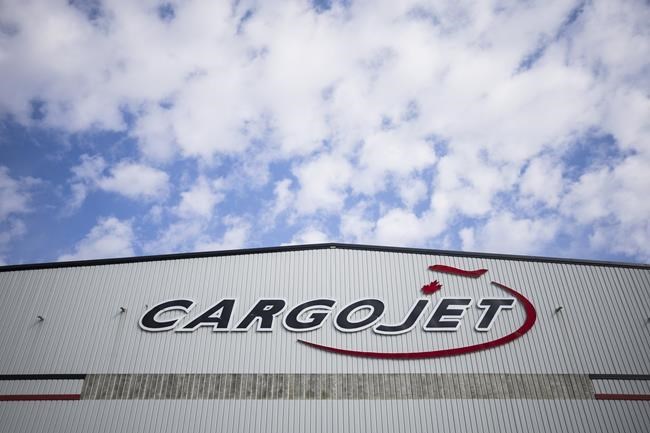Cargojet Inc. swung to a loss last quarter as it felt the pinch of falling consumer demand along with rising inflation, leading the firm to cut back on growth plans.
The air freight and plane leasing company reported a net loss of $34.9 million in its fourth quarter versus a profit of $2.6 million in the last three months of 2022, marking Cargojet's first quarterly loss in nearly two years.
“To say that 2023 was a challenging year for Cargojet would probably be an understatement," co-CEO Pauline Dhillon said Monday.
She cited higher interest rates, “uncontrolled inflation,” a sputtering economy and a consumer pullback from the splurge on doorstep deliveries during the pandemic as key reasons behind the Mississauga, Ont.-based outfit's struggles.
The COVID-19-induced spending wave doubled Cargojet's revenue between 2019 and 2022 and turbocharged its share price to a high that topped $242 in November 2020.
However, that same surge in demand soon posed challenges for the company, as "every passenger airline in sa���ʴ�ý announced their entry into the dedicated air cargo business," Dhillon said.
Cargojet's stock now trades at less than half its 2020 high. Shares closed down $3.54 or about three per cent at $113.51 on Monday, after dipping as low as $108.69 earlier in the day.
Over the past three years, Air sa���ʴ�ý and WestJet established fleets of air freighters rather than hauling ordered goods in their passenger planes.
Nonetheless, co-CEO Jamie Porteous said Cargojet sees "no threat" from sa���ʴ�ý's two largest airlines domestically, where it has refocused its efforts after ditching plans to expand internationally with a slate of aircraft aimed at intercontinental trips.
Last month, Cargojet announced it would scale down its fleet expansion by scrapping the purchase of four Boeing 777 airliners. The move came after the company nixed the other four 777s in its initial eight-plane order announced to shareholders in March 2022.
"The move that now centres almost entirely on 767s will see the benefit of a singular fleet that can be more effectively operated at lower cost," said RBC Capital Markets analyst Walter Spracklin in a note to investors.
"We now view Cargojet as much more of a pure-play domestic overnight business and see the (plane leasing) business as filling in the gaps for aircraft utilization."
The change in plans came alongside a change in leadership.
On Jan. 1, Cargojet went through with a C-Suite shuffle announced in November, as then chief executive Ajay Virmani became executive chairman and yielded his top spot to chief corporate officer Pauline Dhillon and chief strategy officer Jamie Porteous — now co-CEOs.
The dual leaders see room for growth this year.
"It seems that consumer spending is a little stronger than it was at the early part of 2023, and we're forecasting mid-to-high single-digit revenue growth on the domestic sector for 2024," Porteous said.
In the quarter ended Dec. 31, Cargojet reported that revenue fell six per cent to $254.7 million from $271.0 million in the same period a year earlier.
On an adjusted basis, Cargojet said it lost 14 cents per share in its latest quarter compared with an adjusted profit of 89 cents per share a year earlier.
The loss notched 117 per cent below analyst expectations of an adjusted profit of 81 cents per share, according to financial markets data firm Refinitiv.
This report by The Canadian Press was first published Feb. 26, 2024.
Companies in this story: (TSX:CJT)
Christopher Reynolds, The Canadian Press



